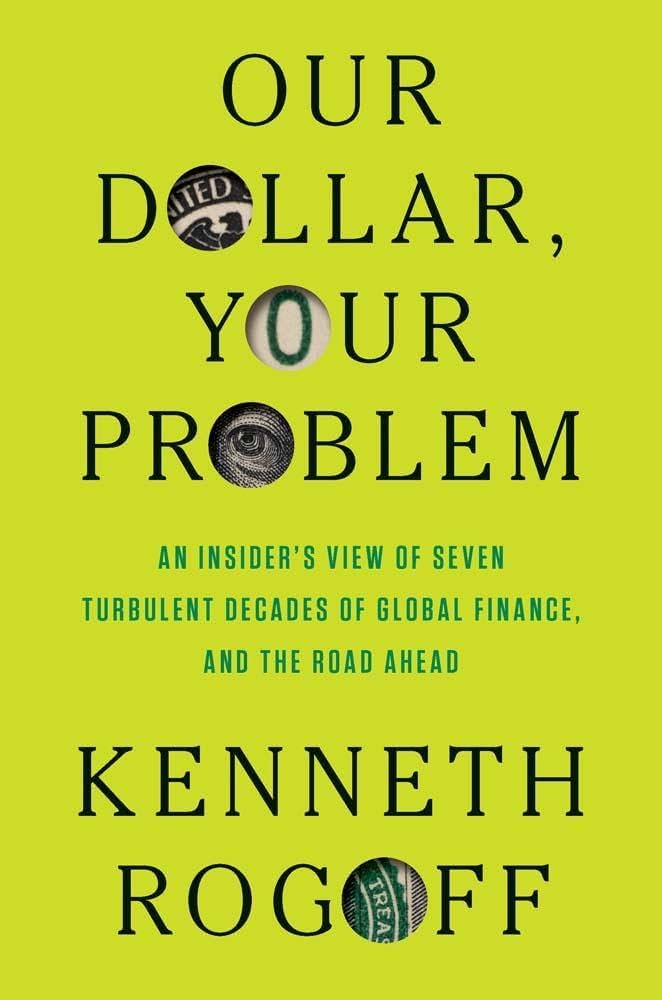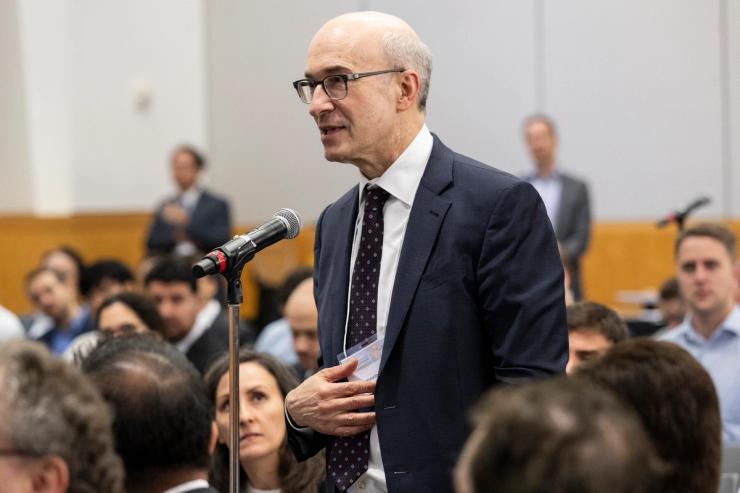The Scene
In Davos this January, in the pre-Liberation Day good times for global capitalism, Ken Rogoff was a rare voice of dissent. The Harvard economist just finished writing a lively but ultimately gloomy book called Our Dollar, Your Problem about the trajectory of global finance, out this week.
The financial elite assembled in the Swiss Alps saw Donald Trump about to unleash “animal spirits” with a party cocktail of tax cuts, deregulation, and anything-goes dealmaking. Rogoff, who had been warning for years about rising US debt, saw a fragile, unlikely system of American economic dominance that was under rising political pressure and almost sure to break.
Rogoff told everyone he talked to, from journalists to hedge funders, that he anticipated a recession within two years and a burst of inflation, set against a backdrop of declining dollar hegemony.
“Everyone I was talking to, particularly about the dollar in decline, said ‘That’s ridiculous,’” Rogoff recalled over a decaf cappuccino at the Harvard Club last week.
He’s been trying to understand how Trump has, in his view, so rapidly accelerated the perhaps-inevitable decline of American financial power. He has settled on a metaphor based on his experience as a chess grandmaster who, as recently as 2012, fought Magnus Carlsen to a tie in a blitz game.
Trump is a “coffeehouse chess player,” he said. “That’s somebody you might meet in Washington Square Park who’s pretty good, but not a lot of book learning.
“They’re very successful against weak opposition by being very aggressive. But they lose to strong opposition because being too aggressive opens them up. A strong player will counter-punch and win.”
Another thing about coffeehouse players, he said: “If you’re not looking carefully, they try to take their moves back.”
Rogoff, who was from 2001 to 2003 chief economist at the International Monetary Fund, arrived at the Harvard Club with a hardcover copy of the new book tucked into his gray World Economic Forum-branded backpack. We talked about the coming storm, the lost art of political economy, and how — in his view — Trump has killed efforts at moderate reform at Harvard.

The View From Ken Rogoff
This conversation has been edited for length and clarity.
Ben Smith: In Davos, I wasn’t sure if you were looking ahead to chaos caused by a Trump administration, or if you were just assuming reversion to the mean.
Ken Rogoff: People didn’t think it was real, right? I have to assume they thought he would not do it. I think what he did shocked his advisors. No one was expecting it.
Did you?
No. It’s shocking. I didn’t expect he would do something as extreme as what he did, and the part of it that I didn’t expect was this “let’s make a deal” part of it. That’s the idiotic part.
If you asked academics how bad it would be just to put in a flat 10% tariff, it’s not that big a deal. If you’ve used the money intelligently, you can cut taxes in other areas. People would adjust. What was disconcerting about this was he wanted to make deals and go to war, and then things are way beyond tariffs.
I just came back from the UK, and — I’m not making this up — [Trump] says, “You have to improve your free speech rules and you can’t have a trade deal without it.” The British are saying, “Free speech was our gift to you.” So it’s the chaos and the incompetence.
I’ve never liked Trump, but I thought he was a pragmatist in economics. He didn’t get everything right in his first term, but he had some good instincts. When something doesn’t work, he changes it, which by the way is the biggest problem with progressives; when it doesn’t work, they don’t change. He’s good about that.
But [Trump] really believes it. The comparison to Liz Truss is hard not to make, where the British joked there was a “moron premium” in British bonds. We certainly had an incompetence premium.
Does this accelerate your worries about recession and inflation — or is it not too late for him to dial it back?
It’s too late. Let’s forget about the recession; when you’re talking about the decline of the dollar, you can’t unring that bell.
This isn’t in the book, [but] a G7 central banker came to my office at Harvard seven or eight years ago. He tells me how much he hates it that the US sees everything, because of the dollar dominance. He had just bought something for his wife. It was an intra-European transaction, but done with a credit card that clears through the US and it just infuriated him that Trump could literally see it if he wanted to. This is a person who really, really knew the system. This isn’t a casual comment that he’s making. He hated it and he explained the Europeans were trying to get away from it. The rest of the world is looking to have other options.
And then there are these concerns that I talk about in the book. There’s an unsustainable deficit, which is not an arithmetic claim, it’s a political economy claim. We’re not prepared to do whatever it takes. ... No country, even Argentina, needs to default — or needs to have inflation, in our case. And then Federal Reserve independence worries me a lot.
You wrote a key early paper about the independence of the Fed. Do you think Trump will try to fire Powell? And what happens if he does? Is there a safe room in the basement of the Fed they stick him in?
Both sides want to take away Fed independence to a significant extent. What Trump says [in public], every president says in private. And you could do it in the blink of an eye. There’s no constitutional protection to the Fed — none, zero. It could be eliminated if you had congressional support, and Congress could make the Treasury secretary a Fed governor.
The way I would describe the Fed is it bends with the wind. So under Biden they produced all this research on inequality and the environment. And they’ll bend with the wind with Trump. So it’s already in some sense not independent.
Do you think Trump’s pressure for the Fed to cut rates will work?
Like many things Trump does, he shoots himself in the foot. So they should be cutting faster, and they won’t because of Trump.
You remarked to Tyler Cowen the other day that “people have forgotten about political economy.” What do you mean?
So much of what young macroeconomists do, particularly when they study monetary policy, is they look at it like setting a thermostat. There’s no person behind it. It’s a machine you’re setting, with no ulterior motives or incentives. If you tell that to an ordinary person, they’re never going to believe you, but a lot of Wall Street has come to believe this.
The inflation expected by the professionals, and particularly the markets, moved up a little bit after Biden. But you look at our debt, you look at some of the challenges that we might have to face with paying for our military, paying for progressive ideas, you know, and on and on, and there are a lot of pressures on us. Why would we think that we’re never going to have another [round of] inflation? It’s their heads in the sand.
We’ll have a pandemic, or a cyber war, or some kind of problem I can’t even imagine, and there’s going to be a balance between taking risks with inflation and taking risks with growth, and this very large debt is going to be one of the reasons we don’t want to take a risk on growth.
What do you make of Trump’s assault on Harvard?
The situation in universities is disastrous… If you go up to about 1910, [Harvard’s assigned] reading lists are fine. After that, it reads like the progressive handbook. 1984 is no longer taught, [The] Catcher in the Rye is no longer taught, because for whatever reason they think it’s too conservative…
If you go to the American Economic Association meetings, the word “inflation” did not appear prominently until this year [according to a recent article]. The word “debt” still doesn’t appear in leading words, but “gender,” “environment,” and “inequality” are leading words.
So there’s this problem of lack of diversity of thought. I certainly think DEI was a good idea taken too far.
We have problems and we need to fix them, but Trump coming along with this incredibly crude overkill art-of-the-deal, saying he wants to run Harvard — well, it’s actually counterproductive. It’s going to have a chilling effect.


